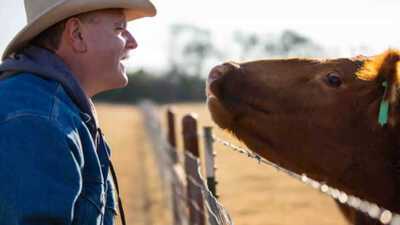A fatal superbug often found in cattle can now transfer to humans and according to researchers it may become untreatable soon. A team from Penn State University discovered that Salmonella Dublin has become increasingly resistant to antibiotics and is spreading among humans through contaminated milk, cheese, beef or through contact with infected cows.
In the study published in Applied and Environmental Microbiology, researchers analysed 2,150 strains of the superbug with 581 from cattle, 664 from humans and 905 from the environment to find that they were all genetically similar, making it easier for the bug to spread across species.
"That's important, because it shows that Salmonella Dublin is highly connected across humans, animals and the environment — so efforts to control it need to consider all three," said study leader Erika Ganda, associate professor of food animal microbiomes.

Salmonella Dublin, usually causes severe illness or death among cows, but it can also lead to serious blood infections among people, specifically those who come in contact with farm animals.
Additionally, the study revealed that the strains have developed the highest levels of antibiotic resistance, particularly to drugs meant to treat infections such as tetracycline and cephalosporins.
Well, an elevated level of antibiotic resistance will make the infection difficult to treat in humans with severe symptoms and longer illness. This can be even more fatal for vulnerable groups such as the elderly, children and those with already weak immune systems.
The authors added that the US is at a greater risk of the superbug turning into a widespread health emergency due to the country being a major beef and dairy-producing country. According to The Centers for Disease Control and Prevention (CDC), the bacteria cause about 1.2 million illnesses in the US every year.
In the study published in Applied and Environmental Microbiology, researchers analysed 2,150 strains of the superbug with 581 from cattle, 664 from humans and 905 from the environment to find that they were all genetically similar, making it easier for the bug to spread across species.
"That's important, because it shows that Salmonella Dublin is highly connected across humans, animals and the environment — so efforts to control it need to consider all three," said study leader Erika Ganda, associate professor of food animal microbiomes.
Salmonella Dublin, usually causes severe illness or death among cows, but it can also lead to serious blood infections among people, specifically those who come in contact with farm animals.
Additionally, the study revealed that the strains have developed the highest levels of antibiotic resistance, particularly to drugs meant to treat infections such as tetracycline and cephalosporins.
Well, an elevated level of antibiotic resistance will make the infection difficult to treat in humans with severe symptoms and longer illness. This can be even more fatal for vulnerable groups such as the elderly, children and those with already weak immune systems.
The authors added that the US is at a greater risk of the superbug turning into a widespread health emergency due to the country being a major beef and dairy-producing country. According to The Centers for Disease Control and Prevention (CDC), the bacteria cause about 1.2 million illnesses in the US every year.
You may also like

Tories demand crackdown on people playing loud music on public transport

Lesser-known 'masterpiece' on Amazon Prime is 'mix of war film and gangster thriller'

2.2 million sign petition for Indian-origin trucker Harjinder Singh: Support grows for leniency; 45-year sentence looms

Gabriel Jesus drops new Arsenal injury update amid Mikel Arteta return boost

Eberechi Eze explains Tottenham snub in first comments on £67.5m Arsenal transfer







